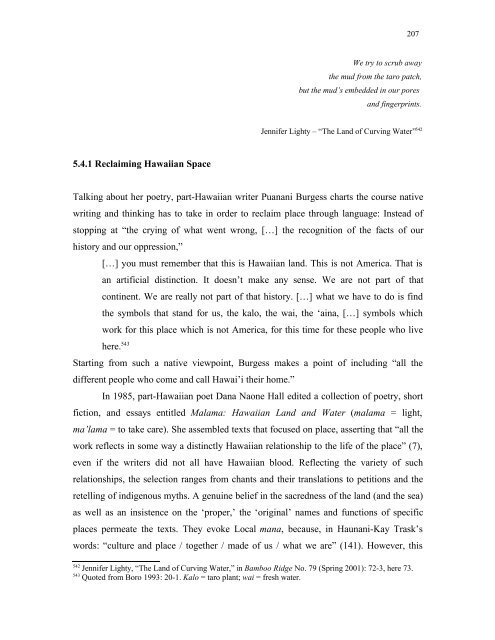A Paradise Lost - KOPS - Universität Konstanz
A Paradise Lost - KOPS - Universität Konstanz
A Paradise Lost - KOPS - Universität Konstanz
You also want an ePaper? Increase the reach of your titles
YUMPU automatically turns print PDFs into web optimized ePapers that Google loves.
5.4.1 Reclaiming Hawaiian Space<br />
We try to scrub away<br />
the mud from the taro patch,<br />
but the mud’s embedded in our pores<br />
and fingerprints.<br />
Jennifer Lighty – “The Land of Curving Water” 542<br />
Talking about her poetry, part-Hawaiian writer Puanani Burgess charts the course native<br />
writing and thinking has to take in order to reclaim place through language: Instead of<br />
stopping at “the crying of what went wrong, […] the recognition of the facts of our<br />
history and our oppression,”<br />
[…] you must remember that this is Hawaiian land. This is not America. That is<br />
an artificial distinction. It doesn’t make any sense. We are not part of that<br />
continent. We are really not part of that history. […] what we have to do is find<br />
the symbols that stand for us, the kalo, the wai, the ‘aina, […] symbols which<br />
work for this place which is not America, for this time for these people who live<br />
here. 543<br />
Starting from such a native viewpoint, Burgess makes a point of including “all the<br />
different people who come and call Hawai’i their home.”<br />
In 1985, part-Hawaiian poet Dana Naone Hall edited a collection of poetry, short<br />
fiction, and essays entitled Malama: Hawaiian Land and Water (malama = light,<br />
ma’lama = to take care). She assembled texts that focused on place, asserting that “all the<br />
work reflects in some way a distinctly Hawaiian relationship to the life of the place” (7),<br />
even if the writers did not all have Hawaiian blood. Reflecting the variety of such<br />
relationships, the selection ranges from chants and their translations to petitions and the<br />
retelling of indigenous myths. A genuine belief in the sacredness of the land (and the sea)<br />
as well as an insistence on the ‘proper,’ the ‘original’ names and functions of specific<br />
places permeate the texts. They evoke Local mana, because, in Haunani-Kay Trask’s<br />
words: “culture and place / together / made of us / what we are” (141). However, this<br />
542 Jennifer Lighty, “The Land of Curving Water,” in Bamboo Ridge No. 79 (Spring 2001): 72-3, here 73.<br />
543 Quoted from Boro 1993: 20-1. Kalo = taro plant; wai = fresh water.<br />
207

















